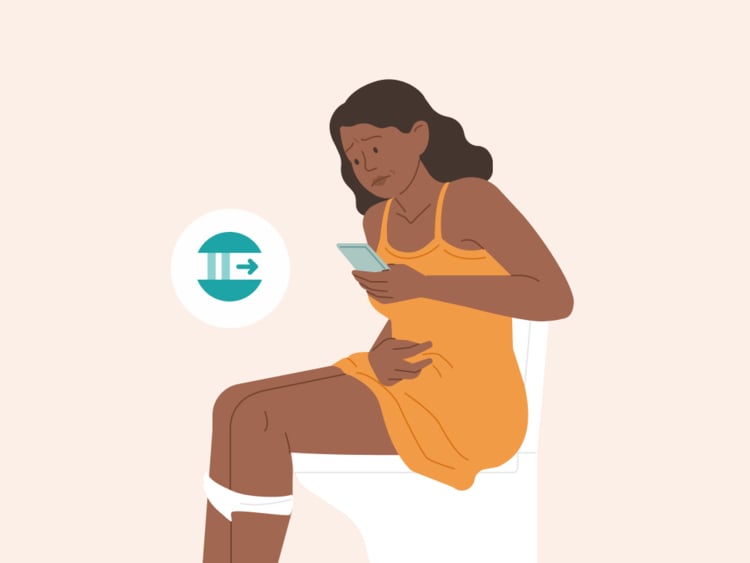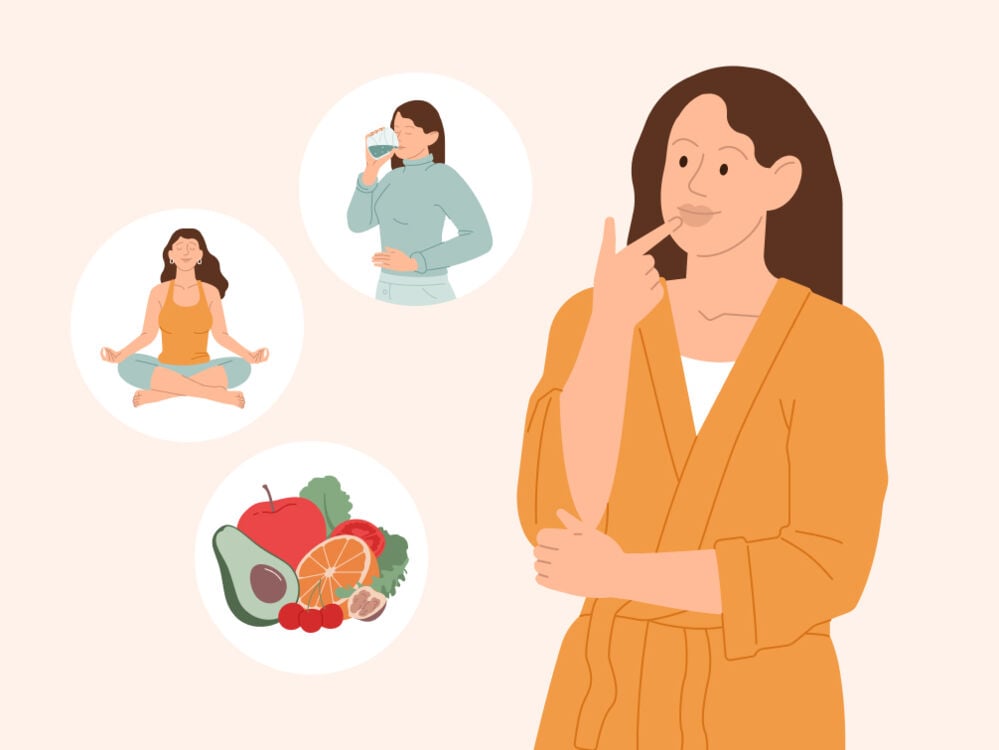It may not be the most widely known symptom, but fluctuations in your hormone levels during your cycle may impact your bowel movements. Here's everything you need to know about constipation during ovulation.
-
Tracking cycle
-
Getting pregnant
-
Pregnancy
-
Help Center
-
Flo for Partners
-
Anonymous Mode
-
Flo app reviews
-
Flo Premium New
-
Secret Chats New
-
Symptom Checker New
-
Your cycle
-
Health 360°
-
Getting pregnant
-
Pregnancy
-
Being a mom
-
LGBTQ+
-
Quizzes
-
Ovulation calculator
-
hCG calculator
-
Pregnancy test calculator
-
Menstrual cycle calculator
-
Period calculator
-
Implantation calculator
-
Pregnancy weeks to months calculator
-
Pregnancy due date calculator
-
IVF and FET due date calculator
-
Due date calculator by ultrasound
-
Medical Affairs
-
Science & Research
-
Pass It On Project New
-
Privacy Portal
-
Press Center
-
Flo Accuracy
-
Careers
-
Contact Us
Constipation during ovulation: Is it a thing?


Every piece of content at Flo Health adheres to the highest editorial standards for language, style, and medical accuracy. To learn what we do to deliver the best health and lifestyle insights to you, check out our content review principles.
From cramps and bloating to mood swings, premenstrual symptoms are pretty well documented. We’re all different, but many of us will notice changes in the way we feel in the run-up to our period. But what about ovulation? Are there similar symptoms associated with this point in your cycle, namely, can ovulation cause constipation?
The truth is, while constipation isn’t considered to be a symptom of ovulation, any evidence we have right now about ovulation and constipation is anecdotal. However, if you are experiencing constipation, then make sure that you go easy on yourself, stay hydrated with water, and try to eat fiber-rich foods like fruit, beans, and whole grain rice. Here’s what we know about the links between your cycle and constipation and what you can do to manage it.
Key takeaways
- Your menstrual cycle is driven by the rise and fall of your sex hormones (progesterone, estrogen, luteinizing hormone, and follicle-stimulating hormone). These natural chemicals are released at various points in your cycle to trigger different processes, including ovulation. This is when one of your ovaries releases an egg to be potentially fertilized by a sperm.
- One such hormone, progesterone, has been linked to changes in bowel movements. It’s been suggested that as your progesterone levels rise just before ovulation, it can cause constipation.
- Some people also report feeling bloated or cramps just before ovulation.
- Constipation is never pleasant and can be uncomfortable. There are things you can do at home to help alleviate it, such as eating fiber-rich foods, exercising if you can, and drinking plenty of water.
- Talking about constipation with your doctor might feel embarrassing, but try to remember that they’ve heard it all before, and they’re there to support you. If you experience constipation often, then don’t hesitate to speak to a medical professional.
Is there a link between ovulation and constipation?
Constipation is defined as having fewer than three bowel movements a week. However, our poop pattern is pretty unique to us. While some people will have three poops a day, others may be more accustomed to twice a week. You know what’s normal for you.
Constipation is also incredibly common. Around 2.5 million people in the United States see a health care professional each year due to constipation. So, if you’re struggling to poop, you’re not alone.
Take a quiz
Find out what you can do with our Health Assistant
If you’ve noticed a deviation from your normal pooping regimen cyclically, then you may be wondering if it has something to do with ovulation. You may experience constipation just after ovulation, which is linked to the rise in your hormone progesterone just after one of your ovaries releases an egg. Your progesterone levels continue to rise after ovulation. Progesterone is responsible for helping your uterine lining to grow and thicken, making it easier for your egg to implant and a pregnancy to develop if it’s met by a sperm.
Your progesterone levels can remain high in the days after ovulation. This part of your cycle, between ovulation and your period, is called the luteal phase. “Constipation is most common in the luteal phase of the menstrual cycle because of the increase in progesterone. Progesterone slows down the gastrointestinal tract, which can lead to constipation,” says Dr. Sara Twogood, an obstetrician and gynecologist at Cedars-Sinai Medical Group in California, US.
A limited number of studies — like this one from 2003 with only 42 participants — have also noted that more women experience constipation during the luteal phase. Some research has linked high progesterone levels with restricting bowel movements. Basically, if you’re constipated at this point in your cycle, it could be due to your hormones, but we need more research.
What about a link between ovulation and diarrhea?
While hormonal changes during your cycle have been linked to constipation, they have also been linked to diarrhea. They may seem like opposites, but the explanation is pretty similar.
It’s thought that the hormone-like substances called prostaglandins play a key role during ovulation, and you may have higher levels of prostaglandins just before your ovaries release an egg.
“Prostaglandins are chemical messengers that are increased around ovulation — and right before and during a period,” explains Dr. Twogood. “Prostaglandins relax smooth muscles. Relaxation of smooth muscles in the bowel may lead to diarrhea or loose bowel movements.”
Some links have been made between prostaglandins and diarrhea, but this is usually around the time of your period. There isn’t currently any medical research or evidence that has looked into the effects of prostaglandins on ovulation.
Possible ways to alleviate constipation
Since constipation isn’t a typical symptom of ovulation, it can be hard to know whether you should expect it or how to manage it. However, changes to your poop can be uncomfortable and take a toll on your body, so there are some things you can do at home, including:
Stay hydrated: Drink plenty of water and avoid alcohol.
Eat more fiber: Gradually increase the amount of fiber-rich foods in your diet. You could try switching to whole wheat bread and eating more whole grains like whole grain pasta, brown rice, and bulgar wheat.
It’s also a good idea to incorporate plenty of fruits and vegetables into your diet, which are generally high in fiber, alongside foods like flaxseeds, oats, and legumes such as peas, beans, or lentils. Fruits like apples, apricots, grapes, raspberries, and strawberries also contain a natural laxative called sorbitol.

Move your body if you can: Going for regular walks or runs can help you to poop more.
Dr. Twogood also says that if you’re prone to constipation throughout your cycle, “Avoiding constipating foods is important — including dairy, white rice and white flour, processed foods, and sweets. Foods that contain natural laxatives, like papaya and prunes, can help. Many over-the-counter medications can have constipation as a side effect, including many used to help with cold, flu, and allergy symptoms. Prescription medications may also be constipating, and this can be discussed with the prescribing doctor.”
Taking care of your body throughout your cycle
When it comes to our cycles, we’re all different. You may experience constipation during some cycles and not during others, and you may also get other period poop symptoms like diarrhea. On the other hand, you may experience none of these symptoms. Plenty of people don’t notice any changes to their pooping patterns during their cycle. In a nutshell, it’s hard to make generalizations as there simply isn’t enough research.
“Constipation during ovulation is not a universal symptom, but if someone is tracking their cycle and notices they are always constipated around ovulation, this information can be helpful,” says Dr. Twogood. “They can know this is a normal pattern for them and be proactive in choices to help reduce it — such as staying hydrated, increasing fiber, and avoiding constipating foods or over-the-counter medications.”
Understanding your cycle, when you might be ovulating, and the changes in the way you feel at different points in your cycle may help you feel better prepared. You can do this using an app like Flo. Similarly, it’s important to listen to your body and look after yourself. If you have any concerns, always speak to a health care professional. No question is considered embarrassing, and you’re in safe hands.
More frequently asked questions about constipation during ovulation
Is it normal to be constipated during ovulation?
Given the lack of research, it’s hard to give a definitive answer to this question. You might experience constipation around ovulation due to a fluctuation in your progesterone levels. However, not everyone will experience this. It depends on you and your body.
Can ovulation affect bowel movements?
While there isn’t enough evidence to back up specific theories, it’s thought that fluctuating hormones during the menstrual cycle can affect bowel movements, including causing constipation and diarrhea.
When in your cycle might you be constipated?
Some researchers have found that you are more likely to experience constipation during the second half of your menstrual cycle — known as the luteal phase — when there is an increase in progesterone.


Hey, I'm Anique
I started using Flo app to track my period and ovulation because we wanted to have a baby.


The Flo app helped me learn about my body and spot ovulation signs during our conception journey.


I vividly
remember the day
that we switched
Flo into
Pregnancy Mode — it was
such a special
moment.
Real stories, real results
Learn how the Flo app became an amazing cheerleader for us on our conception journey.
References
Clark, Kenneth E., and Myatt, Leslie. “Prostaglandins and the Reproductive Cycle.” The Global Library of Women’s Medicine, Jan. 2008, www.glowm.com/section-view/heading/Prostaglandins and the Reproductive Cycle/item/313.
“Constipation.” Mayo Clinic, 20 Oct. 2023, www.mayoclinic.org/diseases-conditions/constipation/diagnosis-treatment/drc-20354259.
“Constipation.” Cleveland Clinic, my.clevelandclinic.org/health/diseases/4059-constipation. Accessed 14 Jan. 2025.
“Constipation.” NHS, www.nhs.uk/conditions/constipation/. Accessed 14 Jan. 2025.
“Here’s the Deal with Period Poops” Cleveland Clinic, 29 Oct. 2021, health.clevelandclinic.org/why-do-you-poop-more-on-your-period.
Jung, Hye-Kyung, et al. “Effects of Gender and Menstrual Cycle on Colonic Transit Time in Healthy Subjects.” The Korean Journal of Internal Medicine, vol. 18, no. 3, Sep. 2003, p. 181–86, doi:10.3904/kjim.2003.18.3.181.
“Ovulation.” Cleveland Clinic, my.clevelandclinic.org/health/articles/23439-ovulation. Accessed 14 Jan. 2025.
“Premenstrual Syndrome (PMS).” Mayo Clinic, 25 Feb. 2022, www.mayoclinic.org/diseases-conditions/premenstrual-syndrome/symptoms-causes/syc-20376780.
“Progesterone.” Cleveland Clinic, my.clevelandclinic.org/health/body/24562-progesterone. Accessed 14 Jan. 2025.
“Prostaglandins.” Cleveland Clinic, my.clevelandclinic.org/health/articles/24411-prostaglandins. Accessed 14 Jan. 2025.
Thiyagarajan, Dhanalakshmi K., et al. “Physiology, Menstrual Cycle.” StatPearls, StatPearls Publishing, 27 Sep. 2024, www.ncbi.nlm.nih.gov/books/NBK500020/.
“What Ovulation Signs Can I Watch for if I Want to Get Pregnant?” Mayo Clinic, 9 July 2024, www.mayoclinic.org/healthy-lifestyle/getting-pregnant/expert-answers/ovulation-signs/faq-20058000.
“What to Do When Medication Makes You Constipated.” Harvard Health Publishing, 22 Oct. 2019, www.health.harvard.edu/staying-healthy/what-to-do-when-medication-makes-you-constipated.
Xiao, Zuo-Liang, et al. “Role of Progesterone Signaling in the Regulation of G-Protein Levels in Female Chronic Constipation.” Gastroenterology, vol. 128, no. 3, Mar. 2005, pp. 667–75, doi: 10.1053/j.gastro.2004.12.001.




